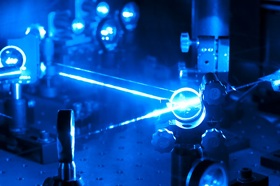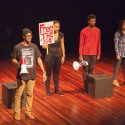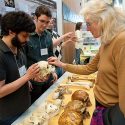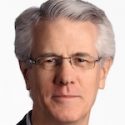UW-Madison celebrates imagination, discovery in the Year of Innovation
From dairy science to dance to vitamin D to stem cells, the University of Wisconsin–Madison has pushed the boundaries of what is known and the limits of what is possible for more than 160 years.

A blue laser light follows a path — through focusing optics and beam splitters — before leading to an automated research microscope in David C. Schwartz’s Laboratory for Molecular and Computational Genomics.
Photo: Jeff Miller
To mark this pioneering spirit, the campus will celebrate the Year of Innovation during the 2012-13 academic year.
The Year of Innovation focuses on three distinct themes.
The first theme reinvigorates the University’s longstanding commitment to innovation in how we teach, how we research, and how we operate.
The second theme explores campus and community interactions and examples of innovation through social entrepreneurship, engaged scholarship and service learning.
The final theme examines the real-world impact of UW–Madison innovations in the area of technology transfer and knowledge transfer.
“We have created an environment that stimulates the imagination and encourages discovery at UW–Madison,” says Interim Chancellor David Ward. “That culture has sparked innovative approaches that solve technological, medical and social problems. It also leads us to new and creative ways to advance the arts and humanities.”
Plans for the year are being led by a steering committee that draws its membership from across schools and colleges, student life, athletics, the Wisconsin Alumni Research Foundation, the Wisconsin Alumni Association, the Office of Corporate Relations and many more.
“My hope is that the Year of Innovation will expand entrepreneurship, discovery and creativity in ways that will engage and benefit the entire campus and the broader community,” says Ward.
During the year, several major events, co-sponsored by the Wisconsin Alumni Research Foundation, will highlight innovation.
“My hope is that the Year of Innovation will expand entrepreneurship, discovery and creativity in ways that will engage and benefit the entire campus and the broader community.”
Interim Chancellor David Ward
The first will be the Wisconsin Science Festival, which runs from Sept. 27-30, with its headquarters at the Wisconsin Institutes for Discovery, 330 N. Orchard St. There, people of all ages will be able to touch, taste, look, listen and discover the wonders of science, art and innovation through hands-on interactive exhibits and workshops, lectures and demonstrations with leading researchers and creative thinkers.
On Oct. 9, campus will officially launch the year with a special event, “UW is ‘Innovation U’: Building on a Tradition of Innovation.”
The event invites faculty, students and staff from all parts of campus to come together to explore diverse approaches to innovation, ranging from launching new tech ventures to revamping old processes to creating new campus-community connections. Participants will have a chance to work with innovators as well as experts in developing strategies to overcome barriers to innovation and sparking creative contributions.
Other events that will incorporate the themes of the Year of Innovation will be the Go Big Read common-reading project, which this year features the book “Radioactive,” by Lauren Redniss; April’s Undergraduate Research Symposium, which highlights innovative research done on campus, and the Big Learning Event, set for June 5-6, 2013.
The Year of Innovation website captures the past, present and future of innovation at UW–Madison.
The site enables people to learn how students, faculty, staff and alumni have contributed to the legacy of innovation at UW–Madison. Students are the focus of “Innovation Generation,” a dedicated section featuring events and opportunities available to them on campus. Check out the events calendar for upcoming Year of Innovation events and activities.
Finally, the campus community can join in on the conversation on Twitter by following @UW_Innovation and using the hashtag #uwinnovation.
To contact organizers, email yearofinnovation@uc.wisc.edu.
– By Kari Schrage



